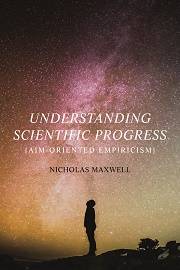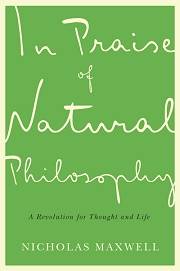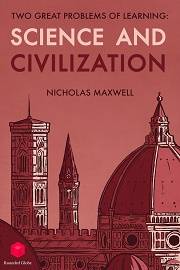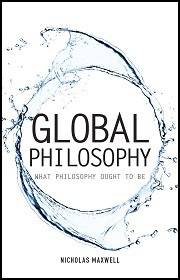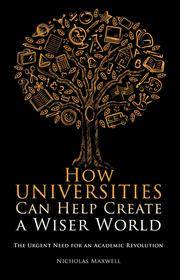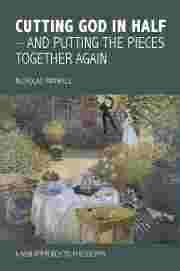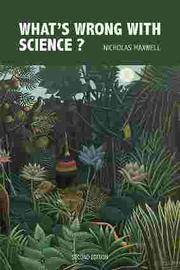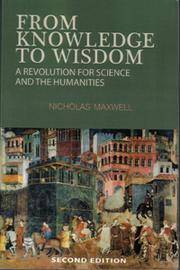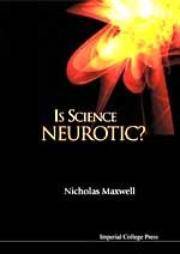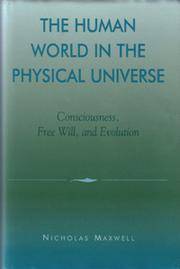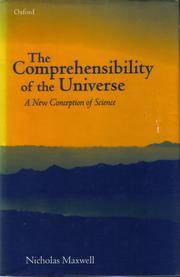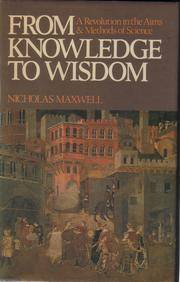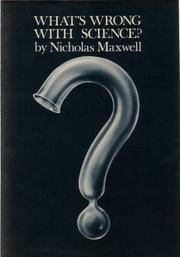Two Fundamental Problems | The First Problem | The Second Problem | Aim-Oriented Empiricism | Aim-Oriented Rationalism | A Realistic Interpretation of Quantum Theory
By Nicholas Maxwell
Two Fundamental Problems
All my research work, and much of my teaching, during the past 35 years or so, have been concerned, in one way or another, with two fundamental, inter-related problems:
Problem I: How can human life exist - conscious, free, meaningful and of value - if the world really is more or less as modern physical science tells us it is?
Problem II: What ought to be the overall aims and methods of science, and of academic inquiry more generally, granted that the basic task is to help humanity achieve what is of value - a more civilized world - by cooperatively rational means (it being assumed that knowledge and understanding are of value in themselves and form a part of civilized life)?
Both problems have played a central role in the history of thought.
The first problem begins with Democritus; aspects of the problem can be found in the writings of Galileo, Kepler, Boyle, Newton; it is central to the work of Descartes, Locke, Berkeley, Hume, Kant and, in more recent times, has been of concern to such diverse thinkers as Whitehead, Russell, Stebbing, Popper, Dennett, Nagel and Searle.
The second problem (appropriately interpreted) occupies a central place in the thought of Socrates, Plato and Aristotle; it is basic to the work of Francis Bacon, Descartes, Locke; it has a fundamental role to play in Enlightenment thought of the 18th century; and that aspect of the problem that has to do with the pursuit of knowledge has continued to play a central role in philosophy and philosophy of science down to the present.
Back to Top
The First Problem
The first problem includes the mind/body problem, the problem of free will and determinism, and the problem of the relationship between facts and values; it includes problems concerning the relationship between perceptual and physical properties, and problems concerning the relationship between different branches of the sciences, from physics via biology to psychology. It involves problems concerning the interpretation of the neurosciences, Darwinian theory, and modern physical theory, especially quantum theory; and it involves questions concerning scientific realism, scientific essentialism and instrumentalism.
Work that I have done on this problem includes: my MA thesis, my first three papers (published in 1966 and 1968), a series of papers on quantum theory, parts of What's Wrong With Science?, "Methodological Problems of Neuroscience", chapter 10 of From Knowledge to Wisdom, and part 2 of "Induction and Scientific Realism".
My first two papers on the human world/physical universe problem, "Physics and Common Sense" (1966) and "Understanding Sensations" (1968), anticipated Nagel's "What Is It Like To Be a Bat?" by 8 years, and Frank Jackson's "What Mary didn't Know" by 16 years. Especially significant are: these two papers of mine, chapter 10 of From Knowledge to Wisdom, and "The Mind-Body Problem and Explanatory Dualism" (2000).
I have now brought together the various strands of this long-standing research with the publication of my book The Human World in the Physical Universe: Consciousness, Free Will and Evolution (Rowman and Littlefield, 2001).
Back to Top
The Second Problem
My work on the second problem has arisen out of my concern with the central problem of the philosophy of science, namely the problem of induction, the problem of the rationality of science.
In 1972 I published a paper entitled "A Critique of Popper's Views on Scientific Method", in which I argue that Popper fails to solve the problem of induction because his methodology fails to exclude theories that score highly in terms of empirical content and empirical success but are grossly ad hoc and non-explanatory.
This led to a long two-part paper, published in Philosophy of Science in 1974, entitled "The Rationality of Scientific Discovery", in which I argue that the persistent exclusion from science of empirically successful but grossly ad hoc theories means that science makes a substantial, persistent, implicit metaphysical assumption, to the effect that the universe has some kind of unified structure.
At any given stage in its development, science must assume that the universe is comprehensible in some way or other, and yet the particular version of this assumption that is made, at any given stage, is almost bound to be wrong (as the historical record so vividly illustrates).
The basic aim of science, of discovering in what precise way the universe is comprehensible, is problematic. Hence, as science proceeds it needs to revise its ideas about the way in which the universe is comprehensible. And as the aim of science is revised in this way, so too are the methods of science. (The transition from Aristotelian metaphysics to Galilean metaphysics, or the transition from the corpuscularianism to Boscovichean point-atomism, leads to an associated change of methods.)
In order to proceed rigorously, so as to maximize the chance of scientific progress, science needs to make explicit implicit, influential and problematic assumptions about how the universe is comprehensible, so that alternative assumptions can be considered, and so that aims and associated methods may be improved.
On this view, then, there is a persistent interplay between improving knowledge and improving aims and methods; only at the metamethodological is there persistence and unity of method.
Put another way, as scientific knowledge improves, knowledge-about-how-to-improve-knowledge improves as well, a vital feature of scientific rationality which helps to explain the explosive growth of scientific knowledge. (Ideas in some respects similar to this have been subsequently expressed by Larry Laudan, with the big difference that Laudan is an anti-realist.)
Back to Top
Aim-Oriented Empiricism
It is just this "aim-oriented empiricist" conception of science that we find Einstein putting into scientific practice in developing special and general relativity, and even advocating in an increasingly explicit way in his later years (a point developed in some detail in part 3 of "Induction and Scientific Realism", published in the British Journal for the Philosophy of Science in 1993).
Aim-oriented empiricism, I claim, solves the central problem of the discipline, namely the problem of induction.
The view has fruitful implications, not only for the philosophy of science and for science education, but for science itself: it provides a rational, if non-mechanical and fallible, method of discovery in science (which Einstein made essential use of in developing special and general relativity).
Once aim-oriented empiricism is accepted, the way in which one conceives of the relationship between science and philosophy changes: philosophy of science, concerned with problems about the aims and methods of science, becomes a vital part of science itself (too important for scientists to leave to philosophers!).
For a substantiation of these claims, see, in addition to the papers already mentioned: "Induction, Simplicity and Scientific Progress" (1979); "Science, Reason, Knowledge and Wisdom: A Critique of Specialism" (1980); From Knowledge to Wisdom, Chapter 9 (1984); and The Comprehensibility of the Universe (1998, Oxford University Press, paperback January 2003). Here is my most recent exposition of aim-oriented empiricism.
After putting forward aim-oriented empiricism, in 1974, I have been concerned to develop the view, and spell out its implications for science and the philosophy of science: this has been brought to fruition in The Comprehensibility of the Universe.
But I have also been concerned to generalize the conception of scientific rationality embodied in aim-oriented empiricism, and apply it to other branches of academic inquiry, and to other fields of human endeavour, besides science.
Here, in a sense, I have followed Popper's example. Just as Popper generalizes falsificationism so that it becomes critical rationalism, I have generalized aim-oriented empiricism so that it becomes aim-oriented rationalism.
Back to Top
Aim-Oriented Rationalism
Aim-oriented rationalism becomes relevant whenever our basic aims are problematic, and we need therefore to improve our aims and methods as we proceed. The most important and general application of this idea is to the task of creating sustainable global civilization.
All this corrects and brings up to date the Enlightenment Programme of the 18th century, which sought to learn from scientific progress how to achieve social progress towards a more enlightened world. It is above all in my book From Knowledge to Wisdom that I try to carry this programme through.
Most of my work yet to come will be concerned to develop further this research programme: it is the central concern of my projected books, How Can We Build a Better World? and Implications of Wisdom. In The Odd Couple (forthcoming) I argue that the History and Philosophy of Science ought to take up much more actively these urgent issues.
Back to Top
A Realist Interpretation of Quantum Theory
My work on quantum theory straddles both of the above two fundamental problems.
In tackling the problem of how to put together the physical universe and the human world I have sought to solve the harshest version of this problem. Instead of blurring the problem at the edges by adopting an instrumentalistic interpretation of scientific knowledge, from the outset I have tried to confront the problem in its severest form by adopting a realist, even an essentialist interpretation of theoretical scientific knowledge.
At once one is faced with the problem of how quantum theory can be interpreted realistically. Since 1972, the year of my first publication on the subject, I have argued, in a series of publications, that a new version of quantum theory is required that eschews all mention of measurement in its basic postulates, specifies precisely, in quantum mechanical terms, the physical conditions for probabilistic transitions to occur, and at the same time solves, in a micro-realistic manner, the central "quantum wave/particle" dilemma - so that quantum theory can stand on its own feet, with its own quantum ontology, independently of any part of classical physics.
As the argument has developed over the years, it has become clear that the failure of orthodox quantum theory to solve the quantum wave/particle problem - its failure to be open to a realist interpretation - renders the theory imprecise, ambiguous, ad hoc, lacking in explanatory power, restricted in scope and resistant to unification.
In other words, from the standpoint of aim-oriented empiricism, with its emphasis on unity as a vital feature physical theory must possess to be acceptable, the disunity of orthodox quantum theory renders the theory severely problematic despite its massive empirical success.
Quantum theory constitutes an important test case for aim-oriented empiricism. And there is a further point. As I have mentioned, aim-oriented empiricism claims to provide a rational (if fallible and non-mechanical) method of scientific discovery, first explicitly exploited by Einstein in developing special and general relativity. In advocating this view, I am at once confronted by the challenge: can I demonstrate the effectiveness of this method of discovery by putting it into scientific practice and myself making a scientific discovery?
In response to this challenge, I have tried to develop a version of quantum theory free of the defects I see in the orthodox version of the theory.
The idea that I have pursued is that probabilistic transitions occur when new particles are created (measurement, involving detection, being a special case of particle creation). I have finally solved the problem of capturing this idea in a new, precise, testable version of quantum theory: see my paper in Physics Letters A 187 (1994), pp. 351-355.
This paper brings 25 years of research to something like a successful conclusion (although problems still remain to be solved, such as how to extend the idea to relativistic quantum theory).
There is an account of this work in The Comprehensibility of the Universe, ch. 7.
At the time of my first publication on quantum theory, in 1972, when I argued that a new version of the theory is needed which makes no use of the imprecise notion of "measurement" in its basic postulates, and specifies precise quantum mechanical conditions for probabilistic transitions to occur, few people indeed were thinking along these lines.
Subsequently, however, more and more research workers have come to take these ideas seriously. In a series of papers, published from 1973 onwards, John Bell independently developed the argument that quantum theory needs to eschew all use of the imprecise notion of "measurement" in its basic postulates.
In my 1988 publication on quantum theory, I refer to the work of a number of physicists who have tried to solve the problem of specifying precise quantum conditions for probabilistic transitions to occur - work published subsequent to my 1972 paper.
Research in this area received a tremendous boost from the paper of Ghirardi, Rimini and Weber (GRW) published in 1986 (Physical Review D34, pp. 470-91). In this paper GRW put forward a version of quantum theory that is precisely of the type that I argued for in 1972.
The version of quantum theory that I have been attempting to develop since 1972 is of the same general type as the GRW theory, though it differs from it in physical details. With my latest publication on the subject, my version of non-relativistic quantum theory becomes a viable alternative, I believe, to the GRW theory, and to the orthodox and Bohm interpretations of quantum theory.
In attempting to indicate the kind of theory we should seek to develop in order to overcome the defects of orthodox quantum theory, I am of course doing no more than attempting to practise what I preach.
Most current views in the philosophy of science make a sharp distinction between science and philosophy of science. Aim-oriented empiricism, to the contrary, insists that, for science to be intellectually rigorous, it is essential that some discussion of rival aims and methods (i.e. more or less specific philosophies of science) forms an integral part of science itself. Exploration and assessment of possible and actual aims for scientific research becomes a vital part of both science and philosophy of science.
It is in this way that my work on quantum theory, striving to indicate the kind of new version of quantum theory we should aim to develop, is my attempt to illustrate in practice what philosophy of physics becomes once aim-oriented empiricism is accepted.
I have found working on quantum theory a challenging and chastening experience. It has taught me much about science; above all it has taught me just how difficult it is to make any worthwhile contribution to science.
In my view, all philosophers of science ought to spend at least some of their time in struggling with some serious scientific problem; without some sort of first-hand experience of scientific research, one's understanding of science is likely to remain inadequate. Even if the quality of one's scientific work does not amount to much, the quality of one's work in the philosophy of science can only be enhanced.
My book The Comprehensibility of the Universe (OUP, 1998, pbk 2003) amounts to a radical reformulation and development of previous work on aim-oriented empiricism, especially in solving problems of simplicity and induction. The Human World in the Physical Universe (Rowman and Littlefield, 2001) gives a comprehensive treatment of the first of my two basic problems.
In 2004 I published Is Science Neurotic? (Imperial College Press, 2004). This book develops further the arguments of previous books, and perhaps in a more engaging manner. A second edition, revised and extended, of From Knowledge to Wisdom was published by Pentire Press in 2007, and a second edition of my first book What's Wrong With Science?, with a new Preface, was published in 2009, also by Pentire Press. In March of 2010 I published Cutting God in Half - And Putting the Pieces Together Again: A New Approach to Philosophy (Pentire Press). In 2012 I published my intellectual autobiography, "Arguing for Wisdom in the University". How Universities Can Help Create a Wiser World: The Urgent Need for an Academic Revolution (Imprint Academic, January 2014) argues that, in order to create a wiser world, it is essential that we bring about a revolution in universities around the world so that they become rationally devoted to helping us solve problems of living, above all our grave global problems.
Back to Top
 Close
Close


